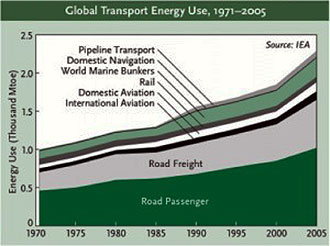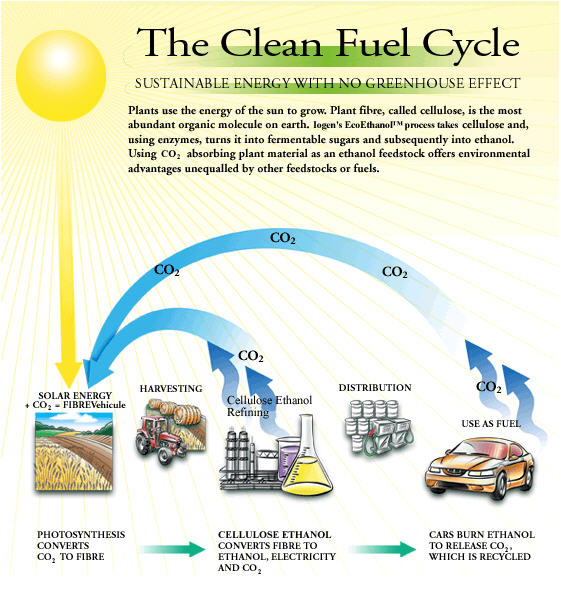|
|
The world's economy is heavily dependent on petroleum to fuel its transportation systems and faces a steadily increasing demand for mobility. According to the International Energy Agency (“IEA”), global demand for motor gasoline in 2007 was approximately 300 billion gallons per year. Economic, political and environmental concerns surrounding petroleum, including rising concerns about climate change, energy security and rising and volatile petroleum prices, have increased the need to find alternatives. The transportation sector accounts for 27% of energy use worldwide. About ninety four percent of that transportation energy comes from petroleum, the greatest majority of which is used in road transport for today's cars and trucks.
 Energy Information Administration (EIA) data also shows that, without a considerable effort, the world will continue to depend almost entirely on oil for its transportation energy through 2035. The conventional fossil fuel industry and associated infrastructure is well established - making change a longer term endeavor. Energy Information Administration (EIA) data also shows that, without a considerable effort, the world will continue to depend almost entirely on oil for its transportation energy through 2035. The conventional fossil fuel industry and associated infrastructure is well established - making change a longer term endeavor.
Two of the primary approaches for addressing these concerns are:
. Increased Vehicle Efficiency: Getting more miles out of each gallon of fuel; shifting driving to lighter, more efficient vehicles, low emission diesel engines, and hybrid and electric cars. This approach reduces the fuel industry's share of the overall transportation market.
. Greater Use of Biofuels: Increasing the use of fuels made from agricultural and forest resources. This approach is attractive to many constituencies because it offers the prospect of growing fuel locally, reducing both energy dependency and carbon emissions.
Renewable biofuels such as cellulosic ethanol can fit seamlessly into the existing transportation fuel distribution network, and its use in blending with gasoline can lead to immediate results in terms of reducing both local and global environmental emissions from today's vehicles.
Fossil fuel resources are also finite, whereas renewable sources of energy have, by their very nature, the ability to regenerate themselves. Cellulosic ethanol, for example, can come from the annual crop residue (straw, corn stover, bagasse) from the production of agriculture crops, or from other biomass such as forest or other wood residue. Cellulosic ethanol can also come from dedicated biomass crops such as switchgrass, miscanthus, or other grasses or dedicated tree plantations grown and harvested specifically for the purpose of producing feedstocks high in in cellulose content. Each year, such crops store carbon as part of their natural growth cycle, and any carbon released in the consumption of cellulosic ethanol is then stored again in next year's crops.

A further advantage of renewable biofuels is that, unlike fossil fuels, which are confined to certain geographies such as the middle east, Nigeria, the Gulf of Mexico, and western Canada including Alberta's oil sands, cellulosic ethanol can be found and/or grown in almost all countries of the world. This means countries can turn their crop residues into fuel or grow dedicated grasses for this purpose.
Brazil's current and future production of ethanol has and will continue to result in an enormous reduction in imported fossil energy (and the wealth transfer that implies), vast local job creation, and the generation of considerable domestic economic activity.
| Fossil Fuels |
Cellulosic ethanol |
| Finite |
Renewable |
| Increases GHG emissions |
Reduces GHG emissions |
| Reduces local air quality |
Improves local air quality |
| Found only in specific geographies |
Found throughout the world, and can be grown locally |
| Frequently imported |
Can be generated locally |
| Fosters foreign energy dependence |
Enables energy self-reliance and security |
| Creates jobs in specific geographies |
Can create jobs in all geographies |
| Expensive |
Less expensive than gasoline |
|


